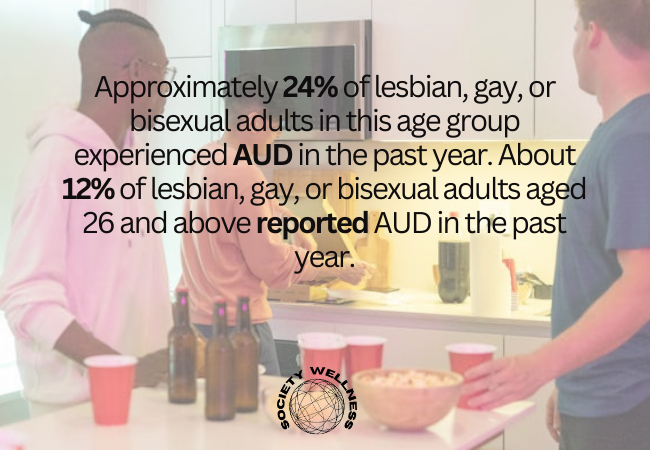Alcohol misuse remains one of the most pressing public health challenges in the world, impacting millions of lives annually. Among LGBTQ individuals, alcohol misuse is often influenced by unique societal, personal, and cultural factors, requiring a nuanced understanding and approach to recovery. Recognizing the difference between alcohol abuse and alcohol dependence is vital for providing effective treatment and supporting lasting recovery.
This comprehensive guide will explore the distinctions between alcohol abuse and dependence, the challenges faced by LGBTQ individuals, and how tailored treatment can pave the way to recovery.
Understanding Alcohol Use Disorders
Alcohol Use Disorders (AUDs) encompass a spectrum of drinking behaviors, from occasional misuse to chronic dependency. Identifying whether someone is engaging in alcohol abuse or has developed alcohol dependence is the first step toward intervention and recovery.
For LGBTQ individuals, the added layer of societal discrimination, family rejection, and identity-related challenges can complicate the identification and treatment of alcohol misuse. This complexity underscores the importance of affirming, specialized care.
Why Differentiating Alcohol Dependence and Abuse Matters
The distinction between alcohol abuse and alcohol dependence isn’t just about terminology—it’s about severity and impact. While alcohol abuse involves risky behaviors that harm one’s health or relationships, dependence indicates a physical and psychological reliance on alcohol that requires structured intervention.
For LGBTQ individuals: Misinterpreting alcohol dependence as casual abuse can delay access to life-saving treatment, further entrenching harmful patterns and increasing the risk of co-occurring mental health disorders.
What Is Alcohol Abuse?
Definition and Characteristics
Alcohol abuse refers to a pattern of drinking that leads to harmful consequences. It doesn’t necessarily involve physical dependence, but it can still have far-reaching impacts on an individual’s health, relationships, and career.
Examples include binge drinking, heavy drinking during social situations, or consuming alcohol in environments where it poses a risk, such as before driving.
Behavioral Signs of Alcohol Abuse
- Using alcohol as a way to relieve stress, anxiety, or other emotional pain.
- Drinking heavily during social events or when alone to “escape.”
- Experiencing frequent hangovers or alcohol-related memory lapses.
- Ignoring responsibilities or obligations due to drinking.
Short-Term and Long-Term Effects
- Short-Term Effects: Impaired judgment, increased likelihood of accidents, risky sexual behaviors, and short-term memory loss.
- Long-Term Effects: Liver disease, cardiovascular problems, relationship conflicts, and diminished cognitive abilities.
Why LGBTQ Individuals Are at Higher Risk
- Social Norms: Many LGBTQ social spaces, such as bars or clubs, normalize excessive drinking as part of the culture.
- Coping Mechanism: Alcohol may be used to manage stress, discrimination, or rejection from family and peers.
- Limited Awareness: LGBTQ individuals might not recognize the early signs of abuse due to internalized stigma or normalization within their community.
What Is Alcohol Dependence?
Definition and Characteristics
Alcohol dependence, often referred to as alcohol addiction, is a chronic condition characterized by a physical and psychological reliance on alcohol. Dependence goes beyond harmful behaviors; it involves physiological changes in the brain that make quitting difficult without professional intervention.
Physical and Psychological Dependency
- Physical Dependency: The body adapts to the presence of alcohol, leading to withdrawal symptoms when alcohol is not consumed. These symptoms can include tremors, sweating, nausea, and severe anxiety.
- Psychological Dependency: Alcohol becomes a perceived necessity to manage emotions, stress, or daily life, creating a vicious cycle of misuse.
Signs and Symptoms of Dependence
- Craving alcohol and prioritizing it above responsibilities or relationships.
- Drinking alone or in secret to avoid judgment.
- Tolerance to alcohol, requiring larger quantities to achieve the desired effect.
- Experiencing withdrawal symptoms such as irritability, headaches, or nausea when not drinking.
LGBTQ-Specific Challenges
- Internalized Shame: LGBTQ individuals may feel ashamed of both their addiction and their identity, leading to increased isolation and reluctance to seek help.
- Dual Stigma: Fear of judgment for both addiction and sexual orientation or gender identity can discourage individuals from accessing care.
Key Differences Between Alcohol Abuse and Dependence
Behavioral vs. Physical Dependence
- Abuse: Characterized by patterns of risky drinking, such as binge drinking or consuming alcohol in unsafe situations.
- Dependence: Involves a physical and psychological reliance on alcohol, often accompanied by withdrawal symptoms.
Frequency and Intensity of Drinking
- Abuse: Sporadic heavy drinking, often triggered by social settings or stressors.
- Dependence: Persistent, uncontrollable consumption of alcohol, often daily or multiple times per day.
Tolerance and Withdrawal
- Abuse: Tolerance and withdrawal symptoms are less common.
- Dependence: Tolerance develops, requiring higher doses to feel the effects, and withdrawal symptoms appear when alcohol use is reduced or stopped.
Why These Distinctions Matter
- Alcohol dependence requires more intensive treatment, including medical detox and inpatient care, while alcohol abuse may be addressed through outpatient counseling and lifestyle changes.
- Misdiagnosing dependence as abuse can leave LGBTQ individuals without the resources they need to recover safely.
Shared Risks and Consequences
Health Risks
Both abuse and dependence contribute to:
- Liver damage and cirrhosis.
- Increased risk of cardiovascular disease.
- Neurological issues, including memory loss and cognitive decline.
Impact on Relationships
- Alcohol misuse can lead to emotional distance, conflicts, and mistrust in personal relationships.
- LGBTQ individuals may experience additional strain if their alcohol use exacerbates existing tensions with family or chosen family.
Financial and Legal Consequences
- Financial strain due to spending on alcohol and related legal issues, such as DUIs.
- LGBTQ individuals may face compounded challenges if financial struggles intersect with housing instability or workplace discrimination.
How Alcohol Use Impacts Mental Health
Co-Occurring Mental Health Conditions
- Anxiety, depression, and PTSD are prevalent among LGBTQ individuals, often driving or exacerbated by alcohol misuse.
The Role of Alcohol in Mental Health Cycles
- Alcohol may provide temporary relief from mental health symptoms but ultimately worsens underlying conditions.
- Rebound anxiety and depression after drinking can trap individuals in a cycle of self-medication and dependency.
Dual Diagnosis Treatment for LGBTQ Individuals
At LGBTQ Addiction Centers, we integrate LGBTQ Mental Health Programs into addiction treatment, addressing the root causes of alcohol misuse and co-occurring disorders simultaneously.
When to Seek Help
Recognizing when to seek help for alcohol misuse is one of the most important steps in the recovery journey. Many individuals delay seeking treatment, often believing they can manage their drinking on their own. However, prolonged alcohol misuse, whether classified as abuse or dependence, can lead to severe health, relationship, and mental health consequences, especially for LGBTQ individuals who may face additional societal stressors.
Signs It’s Time to Seek Help
- Loss of Control Over Drinking:
- You find it difficult to limit your alcohol intake, even when you’ve decided to cut back or stop altogether.
- Drinking has become a priority over responsibilities, relationships, or health.
- Physical Symptoms:
- Experiencing withdrawal symptoms like shaking, sweating, irritability, or nausea when not drinking.
- Building a tolerance that requires consuming larger amounts of alcohol to feel the same effects.
- Mental Health Struggles:
- Using alcohol to cope with anxiety, depression, or trauma.
- Noticing that alcohol use exacerbates feelings of hopelessness, isolation, or emotional instability.
- Impact on Daily Life:
- Declining performance at work or school.
- Strained relationships with family, friends, or partners due to alcohol use.
Why LGBTQ Individuals Should Seek Inclusive Help
For LGBTQ individuals, the decision to seek help can feel overwhelming due to fears of stigma or misunderstanding. Inclusive treatment centers like LGBTQ Addiction Centers offer affirming environments where individuals can feel safe and understood while addressing both substance use and identity-specific challenges.
How to Begin the Journey
- Speak to a Trusted Professional: Start by consulting a healthcare provider or counselor who specializes in addiction.
- Reach Out to LGBTQ Rehab Centers: Facilities that specialize in LGBTQ Addiction Treatment Programs provide culturally competent care tailored to your unique needs.
- Confide in Supportive Loved Ones: Lean on chosen family, friends, or allies who can encourage and support your decision to seek help.
Conclusion
Distinguishing alcohol dependence from alcohol abuse is a crucial step in determining the right treatment path. For LGBTQ individuals, the journey to recovery involves not only overcoming substance misuse but also addressing the societal, cultural, and mental health factors that contribute to it.
At LGBTQ Addiction Centers, we provide affirming, inclusive care tailored to the needs of LGBTQ individuals. Our programs offer safe spaces to heal, rebuild, and rediscover a life free from alcohol misuse. Reach out to us at (888) 598-9510 to learn more about our specialized programs and how we can support your journey to recovery.
Frequently Asked Questions
What is the difference between alcohol abuse and alcohol dependence?
Alcohol abuse involves risky or harmful drinking behaviors, such as binge drinking or drinking in unsafe situations. Alcohol dependence, on the other hand, includes physical and psychological reliance on alcohol, often accompanied by withdrawal symptoms and tolerance.
How do I know if I need professional help for my drinking?
If alcohol is interfering with your daily life, relationships, or health, it’s time to seek help. Signs like withdrawal symptoms, cravings, or an inability to stop drinking despite negative consequences indicate a need for professional treatment.
Why is alcohol misuse more common among LGBTQ individuals?
LGBTQ individuals face unique challenges, such as discrimination, minority stress, and rejection, which can contribute to higher rates of alcohol misuse. Social norms in LGBTQ spaces, like bars or clubs, may also normalize excessive drinking.
What treatment options are available for LGBTQ individuals struggling with alcohol misuse?
Treatment options include:
- Medical detox for managing withdrawal symptoms.
- Inpatient and outpatient programs at LGBTQ Rehab Centers that offer inclusive care.
- Dual diagnosis programs to address co-occurring mental health conditions, such as anxiety or depression.

